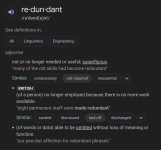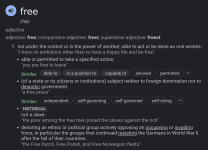By your definition you mean...certainly not by other definitions.
No. I mean the actual definition of the word.
By your definition you mean...certainly not by other definitions.
Why is this distinction so important to you and @Right Divider? I agree with you, but it seems a distraction hardly worth the time, brought up when other topics are at issue.A will, BY DEFINITION, is free.
Thus "free will" IS, by definition, redundant
Why is this distinction so important to you and @Right Divider? I agree with you, but it seems a distraction hardly worth the time, brought up when other topics are at issue.
Fundamentals are always of critical importance. They are what we build everything upon.Why is this distinction so important to you and @Right Divider? I agree with you, but it seems a distraction hardly worth the time, brought up when other topics are at issue.
Because it inherently informs the rest of one's position on the matter, especially when it comes to the topic of God's sovereignty.
Yes, but if someone is building on the idea that we have "free will" and it means the same as what you mean when you say "will". how does the result change someone's idea of God's sovereignty?Fundamentals are always of critical importance. They are what we build everything upon.
The problem comes when someone thinks that "will" means something other than "free will", like Calvinists.Yes, but if someone is building on the idea that we have "free will" and it means the same as what you mean when you say "will". how does the result change someone's idea of God's sovereignty?
You're welcome.Thank you
Ok. Did somebody say they thought that in this thread?The problem comes when someone thinks that "will" means something other than "free will", like Calvinists.
Not to my knowledge.Ok. Did somebody say they thought that in this thread?
However, like I said, God uses repitition to emphasize great truths.You're welcome.
However, like I said, God uses repitition to emphasize great truths.
Isaiah 26:3
Thou wilt keep him in perfect peace, whose mind is stayed on thee, because he trusteth in thee.
The words "perfect peace" are the Hebrew, "shalom shalom" peace peace.
You might want to tell God that He did not need to say "peace peace" when "peace" would have been sufficient.
Good luck with that.

Being redundant is quite different than repeating something for added emphasis.
View attachment 9330
In fact, doing so is, by definition, NOT redundant.
While I agree that evil is not forced on the world by God, He certainly allows it temporarily. But I expect there will be a day when it is no longer present, but still allowed.In order to effectually discuss a subject we must define our terms. If we choose to discuss the various breeds of dogs and their strong points and weak points, we must agree that we are talking about dogs, domestic dogs. To have a worthwhile discussion, we must not let our discussion include coyotes, wolves, or any other wild canines because our discussion is about domestic dogs. Of course, to gain background, we might deepen our analysis by understanding that dogs are domesticated wild canines and that man has bred these wild canines to meet certain expectations, but we would prefer to not go off on tangents. We must center our discussion on our chosen subject. That is, the strong and weak points of various domestic breeds of dogs.
Likewise, with discussions regarding the truth of God's word. We must center our focus on what God has given to us in scripture. Other subjects such as Biblical culture, figures of speech and the study of the grammar of the ancient Biblical languages will enhance the depth of our learning, but we must keep our focus on scripture as the anchor of our discussion.
So, what about phrases, often used that are not quotable from scripture?
For instance, the "sovereignty of God" or "God is in control" Can we actually support those phrases from scripture?
In my learning, I have disagreed with both. However, as I stated above, that is dependent on the definitions we use to describe those phrases.
What does "God is sovereign" mean?
From Jason Lisle's book, Introduction to Logic, his definition of sovereign makes perfect sense to me. "Having supreme power or authority and not required to answer to any higher authority" God, in this sense, is indeed, sovereign.
Any discussion on this is welcome.
Looking now to the idea that "God is in control", I find that to be too vague to be useful
Control of what? How much control?
God gave us free will to make decisions both good and bad. God is not in control of our free will, for if He did, it would not be free will. Note: free will does not include the power to successfully achieve whatever we decide, it is in reference only to be able to decide. For instance, we might decide, like Lucifer, that we should usurp God's throne and sovereignty and make it our own. Both Lucifer and Adam and Eve, and all sinners have done that, with various degrees of cataclysmic results.
In what sense does God control? Did God control Lucifer to force Lucifer to make the decision to attempt to usurp God's throne? No, God did not control Lucider into making that decision. That was Lucifer's choice and his choice only.
Why is there evil in this world? Is it because God forced it into this world because God is in control? Absolutely not. God is good always, we are taught to overcome evil with good, we expect God operates by the same truth.
Evil entered this world because of the poor choices by those who rejected God either knowingly or ignorantly.
God is light and in him is no darkness at all. I John 1:5.
What are are your thoughts?
Please consider:Again:
A will, BY DEFINITION, is free.
Thus "free will" IS, by definition, redundant.
If you succumb to the coercion of others, you are still making your OWN free choice.Please consider:
If I am being coerced to decide something by another person then my decision to acquiesce to the coercion is indeed a true choice but since if I acquiesce to their will then it is not my will I follow but the other guys. Thus it cannot be said that I am following my own will which is the meaning of a free will, not whether I am choosing by my will to go against my own will or not.
Please consider:
If I am being coerced to decide something by another person then my decision to acquiesce to the coercion is indeed a true choice but since if I acquiesce to their will then it is not my will I follow but the other guys. Thus it cannot be said that I am following my own will which is the meaning of a free will, not whether I am choosing by my will to go against my own will or not.
My definition of the words:
FREE means is uncoerced: not an ability to choose.

IF GOD set it up so HIS new creation had no coercion or constraints upon their choices, forcing them to choose anything, they had free will.
The Elements of a True Free Will Choice:
1. Free will
can't be coerced:
Nothing in their created nature could FORCE them to choose love or hate, good or evil, including all genetics...
Nothing in their experience could FORCE them to choose love or hate, good or evil, including all, cultural or familial experience...
Nothing in their understanding or knowledge of reality could FORCE them to choose good or evil, love or hate.
In other words, they had to be completely and truly ingenuously innocent.
[Ref: definition of ingenuous: http://www.thefreedictionary.com/ingenuousness as: 1. Lacking in cunning, guile, worldliness; artless. 2. Openly straightforward or frank; candid.
2. Consequences must be known but not proved:
The person must understand the full consequences of their choice or it is a guess, not a true choice. “What will happen if I choose left or right, the red pill or the blue pill?” must be answered in full detail. How can a person make a real decision about a path in life if they have no idea at all what path to take to find they happiness they seek and avoid the suffering they wish to avoid?
But "PROOF" of the nature of the consequence would compel or coerce the person to choose what was proven to be the best for them. If the answer “death here,” “life there,” was proven, which would you choose? The weight of knowledge would destroy the effect of a true ‘free will’ choice.
If it were proven you would die if you went left, are you truly free to choose to go right? No, you are forced by your knowledge to go right. Therefore they must know, but without proof, the nature of the consequences of their choice.
Only then are they following their own desires, their deepest hope in the nature of reality, defining the reality they most hope will bring them a long and prosperous life..
Aside: our enslavement to sin and total depravity means that though we make choices all the time they are not by our free, uncoerced, will since our wills are eroded by the enslaving addiction to evil. To paraphrase: not by my will but by sins will...so how can our will be said to be free?
Peace, Ted
God is not redundant, He repeats things for emphasis. The expression "free will" has elements of both redundancy and repetition for emphasis.Being redundant is quite different than repeating something for added emphasis.
View attachment 9330
In fact, doing so is, by definition, NOT redundant.
That is true. The word "free" does not imply easy. It could be very difficult to exercise our freedom to choose.If you succumb to the coercion of others, you are still making your OWN free choice.
Try again...
God is not redundant, He repeats things for emphasis.
The expression "free will" has elements of both redundancy and repetition for emphasis.
Well, perhaps you should be instructing God about and with your superior intellectIrrelevant.
Is there such a thing as a will that is not free?
If not, then "free will" is redundant, because you're essentially just saying "free [will that is free]."
If so, then please provide an example of a will that is not, by definition, free. You cannot, because a will is, by definition, free, and since "A = !A" is false (law of non-contradiction), there cannot exist a non-fre
